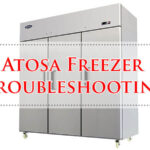For a 50 amp generator plug, you need 6 gauge wire. This size ensures safety and efficiency.
Selecting the right wire size for your 50 amp generator plug is crucial for both safety and performance. The wire size directly impacts the electrical flow and prevents overheating, which can lead to potential hazards. Understanding the requirements for a 50 amp connection helps homeowners and professionals alike ensure that their generator setup is both efficient and safe.
Using a 6 gauge wire supports the electrical load typically expected from a 50 amp generator, allowing for a reliable power source during outages or for portable power needs. This guide aims to simplify the process, making it easier to secure the right materials for your generator’s power demands. Ensuring you have the correct wire size not only complies with electrical codes but also guarantees a smooth operation of your generator when you need it most.
Introduction To Electrical Safety For Generators
Generators provide power when regular sources fail. Safety is key during use. Understanding the right wire size for a 50 amp generator plug is critical. Proper wire choice ensures efficiency and safety. This article guides you through the essentials of wire sizing for generators.
The Importance Of Proper Wire Sizing
Choosing the correct wire size for a 50 amp generator plug is vital. Wire size impacts performance and safety. Wires that are too small can overheat. This can lead to fire hazards and equipment damage. The right wire size carries power effectively and safely.
Risks Of Incorrect Wire Selection
- Overheating: Small wires may overheat under high current.
- Fire Risk: Overheated wires can ignite, posing a fire threat.
- Damage: Appliances can suffer from improper power delivery.
- Efficiency Loss: Inadequate wires waste energy and reduce efficiency.
Always ensure you match the wire size with the generator’s requirements. This prevents risks and maintains optimal performance.
Fundamentals Of Wire Gauge
Fundamentals of Wire Gauge are critical when connecting a 50 Amp generator. The right wire size ensures safety and efficiency. Let’s delve into the details of wire gauge systems and factors influencing wire size selection.
Understanding Wire Gauge Systems
Wire gauge refers to the physical size of the wire. It determines the amount of current the wire can safely carry. The American Wire Gauge (AWG) system is standard in the United States.
- Smaller AWG numbers mean thicker wires.
- Larger AWG numbers mean thinner wires.
- Thicker wires carry more current and have less resistance.
Factors Affecting Wire Size Selection
Selecting the correct wire size for a 50 Amp generator plug is crucial. Here are the main factors:
| Factor | Importance |
|---|---|
| Current Capacity | Choose a wire that can handle at least 50 Amps. |
| Voltage Drop | Longer distances require thicker wires to minimize voltage drop. |
| Insulation Type | Wire insulation affects current carrying capacity. |
| Environment | Outdoor or indoor use influences wire type. |
For a 50 Amp generator plug, typically a 6 AWG wire is recommended. Always consult local electrical codes and a qualified electrician.
50 Amp Generator Plug Specifications
Understanding the specifications for a 50 amp generator plug is crucial. This plug powers heavy-duty appliances. It must meet specific technical requirements. Proper knowledge ensures safe and efficient operation.
Technical Requirements For 50 Amp Service
Wire size is critical for 50 amp services. The minimum recommended size is 6 AWG for most installations. These wires handle the power demand. They reduce the risk of overheating. The insulation type also matters. Wires must withstand the environmental conditions they are exposed to.
- Voltage rating: Typically 240 volts for 50 amp plugs.
- Breaker size: A 50 amp double-pole breaker is standard.
- Plug type: NEMA 14-50R is a common 50 amp receptacle.
Common Uses For 50 Amp Generators
These generators serve various needs. They power RVs, home appliances, and job sites. They are essential during outages. They keep critical systems running.
| Application | Use Case |
|---|---|
| RVs | Air conditioning and kitchen appliances. |
| Homes | Emergency power for multiple rooms. |
| Construction | Heavy-duty tools and machinery. |
Recommended Wire Sizes For 50 Amp Circuits
Selecting the right wire size for a 50 Amp generator plug is crucial. This ensures safety and efficiency. Let’s explore the recommended wire sizes for 50 Amp circuits.
Minimum Wire Size For Safety
For 50 Amp circuits, the minimum wire size is important. The National Electrical Code (NEC) suggests 8 AWG for copper wires. For aluminum wires, 6 AWG is advisable.
Using the correct size prevents overheating and potential hazards. Always follow local codes and standards for safety.
Considering Voltage Drop In Wire Sizing
Voltage drop affects performance. For long runs, larger wires may be necessary. This maintains voltage levels and ensures your equipment runs smoothly.
- Short runs (<50 feet): Stick to minimum size requirements.
- Longer runs (over 50 feet): Consider one size larger to counteract voltage drop.
Choosing the right wire size ensures safety and efficiency. It prevents unnecessary stress on your generator. Always consult a professional for specific projects.
Types Of Wires And Materials
Choosing the right wire for a 50 Amp generator plug is crucial. We need to understand the types of wires and materials available. This ensures safety and efficiency. Let’s dive into the types of wires and their materials.
Copper Vs. Aluminum Wires
Copper wires are a popular choice. They conduct electricity well. They are also flexible and durable. Most professionals recommend copper for home use.
Aluminum wires cost less than copper. They are lighter too. But, they are not as conductive as copper. They also need more care during installation.
Here’s a quick comparison:
| Feature | Copper | Aluminum |
|---|---|---|
| Conductivity | High | Lower than Copper |
| Cost | Higher | Lower |
| Durability | Long-lasting | Needs careful installation |
Insulation And Jacketing Materials
Wires need protection. This is where insulation and jacketing come in.
- Insulation keeps electricity in the wire. It prevents shocks.
- Jacketing protects the wire from physical damage. It also prevents fire risks.
Common materials include:
- PVC (Polyvinyl Chloride) – It is durable and affordable.
- Rubber – Offers excellent flexibility and insulation.
- Teflon – High resistance to temperature and chemicals.
Each material has its benefits. The choice depends on the wire’s use and location.

Credit: www.amazon.com
Installation Best Practices
When installing a 50 amp generator plug, follow best practices. This ensures safety and efficiency. Use the right wire size and installation methods. Below are key steps for proper installation:
Proper Wire Routing And Protection
Choose the correct path for your wires. It should be away from sharp edges. Avoid heat sources and moving parts. Use conduit or wire guards to protect the cables. This prevents damage from external factors. Secure the wire in place with clamps. Make sure the wire does not sag or stretch.
Ensuring Secure Connections
Use terminals and connectors rated for 50 amps. Strip wires cleanly and correctly. Make sure there is no exposed wire outside the terminal. Tighten all connections firmly. This avoids overheating or loose connections. Double-check each connection. Confirm it is secure and properly insulated. Use a torque wrench for best results.
Following these steps helps create a safe and reliable setup. Always refer to local codes and regulations. They may have specific requirements for wire size and installation.
Local Codes And Regulations
Local Codes and Regulations matter when installing a generator plug. Different areas have unique rules. Check these before starting your project. This ensures safety and compliance.
Navigating National Electrical Code (nec) Requirements
The NEC sets standards for electrical safety. It’s key to follow these rules. The right wire size for a 50 amp generator plug is crucial. The NEC typically recommends #6 gauge wire for 50 amp circuits. Yet, local amendments to NEC can change this. Always verify current NEC standards and local codes.
Importance Of Permitting And Inspections
Permits ensure safe installation. They are needed before work starts. Inspections follow after the project’s completion. They confirm everything meets code. Skipping permits and inspections can lead to dangers. It can also cause legal problems. Always get the right permits and schedule inspections.

Credit: www.amazon.com
Maintenance And Troubleshooting
Proper maintenance ensures safety and longevity of your 50 Amp generator plug. Regular checks are crucial. They prevent power issues and hazards. Let’s explore key maintenance and troubleshooting steps.
Regular Inspection For Wire Integrity
Consistent inspections can catch early signs of wear. Look for:
- Discoloration on wires or insulation
- Brittle or cracked wire insulation
- Signs of corrosion on connectors
- Loose connections at the plug
Replace damaged wires promptly. Use the correct wire gauge for replacements.
Identifying Signs Of Overloaded Wires
Overloaded wires are dangerous. They can cause fires. Spot them early:
- Frequent tripping of circuit breakers
- Unusual heat from wires or plugs
- Smell of burning plastic
- Dimming or flickering lights
If you detect these signs, stop using the generator. Consult a professional electrician. Correct wire size and proper installation are key. They keep your system running smoothly and safely.

Credit: www.youtube.com
Frequently Asked Questions
What Gauge Wire Is Needed For 50a Service?
For a 50 amp generator plug, a 6-gauge wire is typically required to ensure safe and reliable operation.
Can I Use 8 Gauge Wire For A 50a Generator?
No, an 8 gauge wire is not suitable for a 50A generator; it’s undersized and may overheat, 6 gauge is the recommended size.
How Long Can 6 Gauge Wire Run For 50a?
For a 50 amp generator, 6 gauge wire can run up to 100 feet without significant voltage drop, ensuring proper performance.
Does The Length Of Wire Affect 50a Generator Performance?
Yes, the longer the wire, the greater the voltage drop. For optimal performance, keep wire runs short and use the correct gauge.
What Type Of Wire Is Best For A 50a Generator Plug?
For a 50A generator plug, use a 6 gauge wire, either copper or aluminum, with suitable insulation rated for outdoor use.
Conclusion
Selecting the right wire size for your 50 amp generator plug is crucial for safety and efficiency. As we’ve outlined, a #6 gauge wire is typically the go-to choice for such installations. Always prioritize adherence to local codes and consider professional advice for optimal performance.
Remember, the correct wire size powers your needs reliably.





